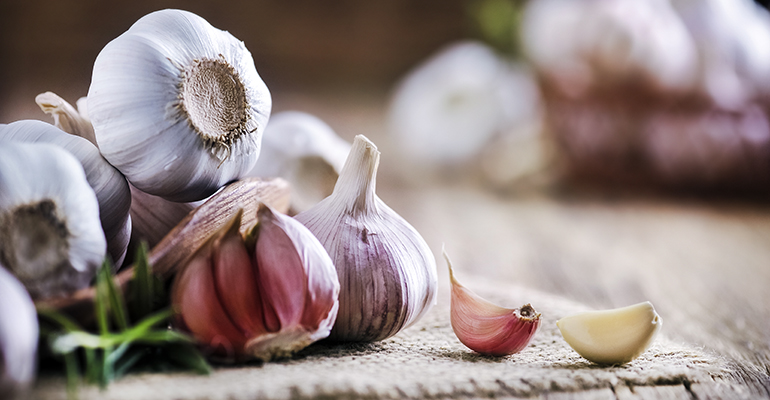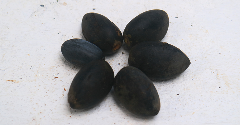Scientists discover the key to garlicy-ness
26 Aug 2020Researchers from Virginia Tech have discovered a biological process in garlic that creates allicin and that may lead to the creation of bulbs with differing levels of pungency. The scientists also said this discovery can contribute to farmers having better control over harvest production and more consistent crops.
This discovery opens the door to R&D professionals to craft strains of garlic that are more or less malordous and garlicy, according to a consumer’s preference. With the ability to regulate the level of pungency in garlic, farmers will also be better able to assess the quality of a crop; currently, it requires cutting into the flavorful allium to determine its strength.

Consistent levels of garlicy-ness will not only be advantageous for farmers, but it will also be a welcome change for manufacturers that use garlic in a variety of packaged products. From pasta sauce to frozen entrees, garlic is a frequently used herb whose fluctuations in strength can cause headaches for companies. With garlic that is not only homogenous but can come in a variety of strengths, it may expand the number of applications that this herb can be used in.
It can also lead to manufacturers favoring stronger strains in order to use less garlic overall – something that has the potential to benefit manufacturers’ bottom lines. Using less quantity of an ingredient can improve cost margins in normal times, but may be especially welcome during the pandemic as garlic has been in short supply which has pushed prices up.
Steep prices for a popular herb that has been linked to immunity-boosting qualities and features a profile full of antioxidant properties will affect not only companies using garlic commercially but also individual consumers. Garlic is featured heavily in kitchens around the world and has only gained popularity in recent years. Data from Blue Book and Agtools Inc. show garlic volume sales rising over the past three years.
Food Ingredients First reported that the scientists are interested in pursuing the characterization of enzymes that produce a similar function to garlic’s allicin. They said they would specifically like to look at onions.
Related news

Asian beverage brands deal with rising costs
4 Jan 2023
Decreasing bottle sizes or increasing prices? Asian beverage brands are finding “creative approaches” to manage rising costs, according to industry analysts.
Read more
Superfrau upcycles liquid whey for energy drinks
22 Dec 2022
US company Superfrau turns surplus whey into sustainable, upcycled-certified dairy products for the recovery drinks market.
Read more
Plant-based fish and seafood launches around the world
12 Dec 2022
From pea protein-based prawns to microalgae-based tuna alternatives, plant-based alternatives to fish and seafood are on the rise around the world.
Read more
Functional food in Japan centres on health and proving claims
8 Dec 2022
The latest Japanese functional food and drink trends put health and product efficacy firmly on the production agenda for new releases.
Read more
‘Super nut’? Indonesia’s ‘best kept secret’ wins EU novel food approval
6 Dec 2022
A previously obscure, nutrient-rich Indonesian nut is set to hit European shelves after winning EU novel foods approval that could also help protect under-threat kenari forests on the archipelago.
Read more
Editor’s choice: Our roundup of the latest women’s health products around the world
2 Dec 2022
From botanicals to combat menopause symptoms to a hydration powder for mothers-to-be, here is our roundup of the most innovative new product launches within women’s health.
Read more
The prize no brand wants to win: 2022’s most misleading products
28 Nov 2022
Food industry watchdog Foodwatch is asking consumers to vote for 2022’s most misleading product. A high-sugar vitamin water and “artisan” salad made with artificial additives are among the nominees.
Read more
enduracarb®: A science-backed trehalose ingredient for athletic endurance
24 Nov 2022
enduracarb® is a science-backed, slow-acting carbohydrate that can power athletes’ performance. Produced using a high-purity production process, it is suitable for a wide variety of applications.
Read more
Discover how Sabinsa’s curcuminoid innovation C3 Reduct® can deliver health and formulation benefits
23 Nov 2022
Sabinsa has developed Curcumin C3 Reduct®, the only reductive metabolites of curcuminoids on the market to have been approved as a Novel Food by the European Food Safety Authority (EFSA). Easy to integrate into existing production processes and with th...
Read more
China bans celebrity endorsement of health and formula foods
22 Nov 2022
China is to ban celebrity endorsement or advertising of certain products, completely banning high profile figures with “lapsed morals” as the country attempts to drive society towards “core socialist values”.
Read more